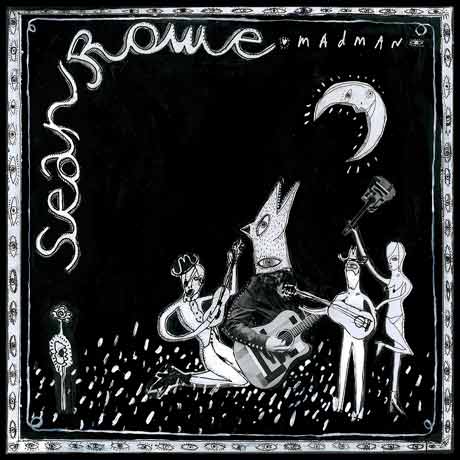The prophetic and distinct voice of Sean Rowe returns with Madman, his latest album, and the third to be released on Anti-. This time around, Rowe bares his teeth, shows his heart and scratches out a fantastic collection of songs that are as memorable for their songwriterly focus as they are for his beautiful baritone bellowing.
Rowe's authoritative voice is on prominent display throughout Madman, and melds well with a variety of styles and key changes. The blue-eyed soul offering "Desiree" introduces Rowe's voice through a twinkling of light and starry percussion as it swaggers in a fashion similar to Bowie on Young Americans. Furthering Rowe's artistic persona as a voice of authority and reason is the choir that often accompanies his choruses on "The Game," "Razor of Love" and album-closer "It Won't Be Long," the latter of which juxtaposes opener "Madman" in being a melodic, guitar-accompanied lullaby with all the solemn reverence of a hymn.
The parental tone matches the message on "My Little Man," the second in a string of bittersweet sentimental songs. In an address to his son, Rowe advises him to "Let your innocence reign for one last refrain" and dreads that "one day my little man won't fit in my hand." Another family-oriented song, "Razor of Love," is probably his most complete and well-written in the 12 that make up the album. The refrains ending the verses and the "de-day-day-day" choruses give the folk ballad an Irish twang. In the harp-decorated spousal reflection, Rowe satirically proposes "You mistake my silence for some kind of doubt, when you lose all your teeth may you please shut your mouth, there may come a day when there's nothing left to say but 'I love you.'" Rowe emotes such a powerful emotional attachment to his objects of affection that his tongue-in-cheek quips can't be perceived as anything else other than love.
Beyond the folk, Rowe makes a lot of noise, though never so much as to disrupt the track arrangement; "Done Calling You," a static blues jam and "The Real Thing," a grungy, double-tracked southern rock song, are examples of the amount of sound Rowe can create on his own. It is in this middle section of the album that Rowe ventures into more freewheeling territory. His finger-picking and rhythmic strumming are elsewhere, but there isn't anything as visceral as some of the face-melting shredding found here.
Doubtless, the boy from Troy, NY has given his audience a lot to chew on with Madman; some of it folk, some of it rock, all of it good.
(ANTI- Records)Rowe's authoritative voice is on prominent display throughout Madman, and melds well with a variety of styles and key changes. The blue-eyed soul offering "Desiree" introduces Rowe's voice through a twinkling of light and starry percussion as it swaggers in a fashion similar to Bowie on Young Americans. Furthering Rowe's artistic persona as a voice of authority and reason is the choir that often accompanies his choruses on "The Game," "Razor of Love" and album-closer "It Won't Be Long," the latter of which juxtaposes opener "Madman" in being a melodic, guitar-accompanied lullaby with all the solemn reverence of a hymn.
The parental tone matches the message on "My Little Man," the second in a string of bittersweet sentimental songs. In an address to his son, Rowe advises him to "Let your innocence reign for one last refrain" and dreads that "one day my little man won't fit in my hand." Another family-oriented song, "Razor of Love," is probably his most complete and well-written in the 12 that make up the album. The refrains ending the verses and the "de-day-day-day" choruses give the folk ballad an Irish twang. In the harp-decorated spousal reflection, Rowe satirically proposes "You mistake my silence for some kind of doubt, when you lose all your teeth may you please shut your mouth, there may come a day when there's nothing left to say but 'I love you.'" Rowe emotes such a powerful emotional attachment to his objects of affection that his tongue-in-cheek quips can't be perceived as anything else other than love.
Beyond the folk, Rowe makes a lot of noise, though never so much as to disrupt the track arrangement; "Done Calling You," a static blues jam and "The Real Thing," a grungy, double-tracked southern rock song, are examples of the amount of sound Rowe can create on his own. It is in this middle section of the album that Rowe ventures into more freewheeling territory. His finger-picking and rhythmic strumming are elsewhere, but there isn't anything as visceral as some of the face-melting shredding found here.
Doubtless, the boy from Troy, NY has given his audience a lot to chew on with Madman; some of it folk, some of it rock, all of it good.
